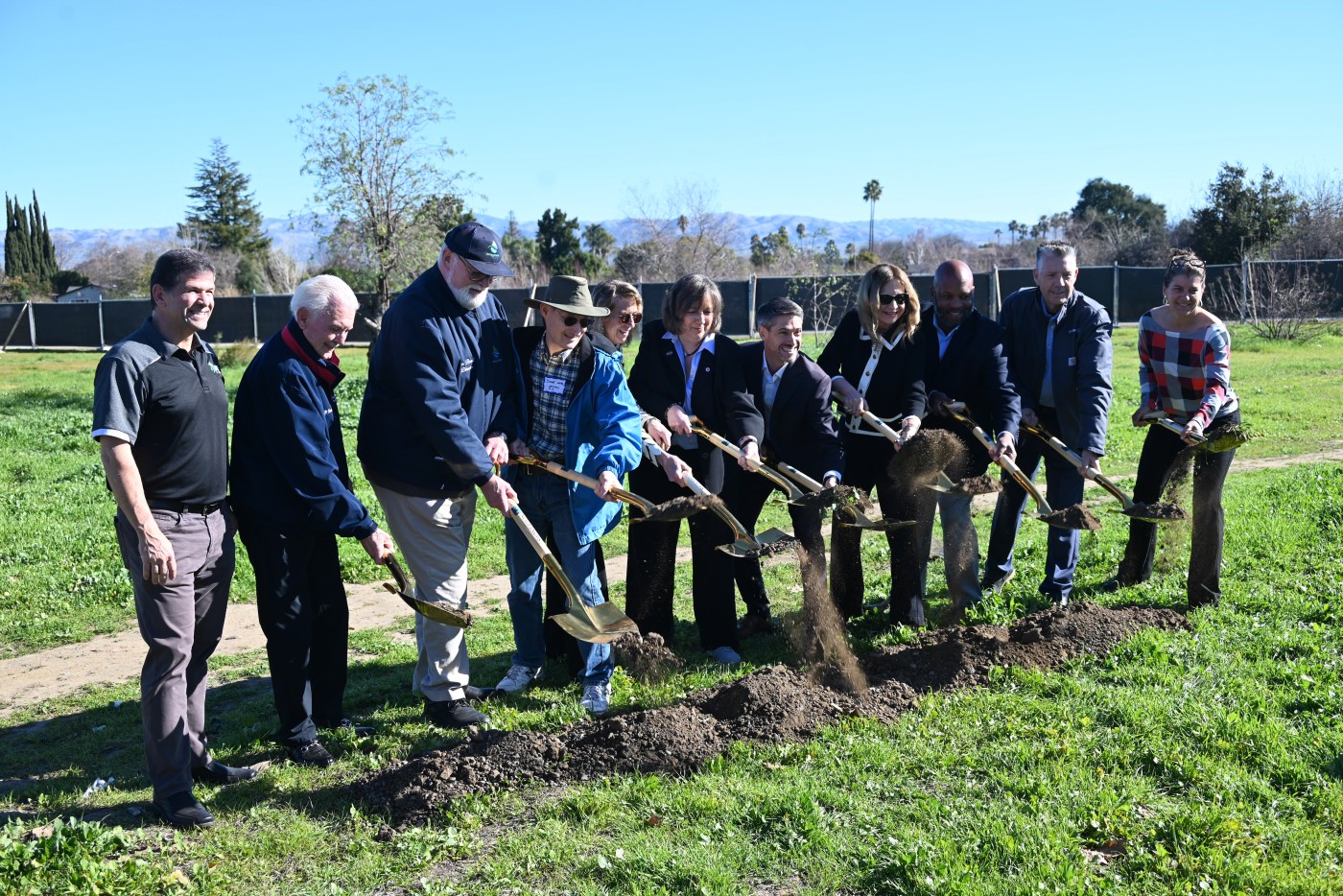
San Jose breaks ground on new interim housing site along Guadalupe River
As part of its ambitious strategy to combat the homelessness crisis, San Jose has broken ground on a new interim housing site along the Guadalupe River to bring more homeless residents indoors and clean up the waterways.
The new 136-bed, tiny home community on the Santa Clara Valley Water District’s 5200 Cherry Ave. property will help the city achieve its goal to nearly triple shelter capacity over the next year and a half.
“We in government have a responsibility for building basic, dignified shelter, interim housing, treatment centers (and) the supportive services people need to turn their lives around and live with dignity,” San Jose Mayor Matt Mahan said. “When they’re available, people have a responsibility for coming indoors and taking advantage of those services. That’s the balance we need to strike to maintain community buy-in and be a city that lives up to our values. We’re going to continue to pursue those dual strategies until we end that era of encampments.”
San Jose currently has 499 units of emergency interim housing, but that will change quickly as the city plans to add hundreds of interim housing at Via Del Oro, the VTA Cerone Yard and the Monterey Road and Branham Lane sites.
The city also recently broke ground on the $30 million expansion of Rue Ferrari, which will more than double its shelter capacity, and will open its 6.3-acre safe parking lot at 1300 Berryessa Road in the coming months that will be able to take 85 vehicles off the streets. DignityMoves will operate the Cherry Avenue site once Swinerton completes construction in the Fall.
Mahan said that the interim housing sites had proven effective in reducing the city’s unsheltered housing population by more than 10% while the rest of the state saw an increase greater than 10%.
Along with creating more than a hundred beds, the city will establish a water resource protection zone stretching from Blossom Hill to Branham to help it comply with the Clean Water Act and the conditions for its stormwater permits.
City officials have estimated that 88% of waterway pollution comes from homeless encampments along creeks and streams.
San Jose Mayor Matt Mahan, center, speaks at the groundbreaking ceremony of a new emergency interim housing site at 5200 Cherry Ave. on Jan. 21, 2025, with District 9 Councilmember Pam Foley, left, DignityMoves CEO Elizabeth Funk and Valley Water District 4 Director Jim Beall, right. (Devan Patel/Bay Area News Group)
Mahan said that homeless residents who had encamped around the surrounding areas would receive priority access to the tiny home community.
The Cherry Avenue project is also different from other interim housing sites in that it represents a more collaborative approach from local and state government, nonprofit providers and philanthropists.
DignityMoves CEO Elizabeth Funk recalled being surprised when asked to speak at a homelessness conference hosted by the water board before realizing that it would take an all-hands approach and treating homelessness like the emergency crisis it is to find solutions.
“That is the kind of all-hands-on-deck that we need,” Funk said. “The Water Board does its part. The neighbors are willing to do their part, philanthropy and (if) all of those things line up, I share that optimism. If we all lean in, this is not insurmountable.”
Funk said that combatting homelessness was the intersection of all different political perspectives. For those worried about smaller government and fiscal responsibility, she said to look at the vast amount of money the government spent on cleanups.
“If you get folks into interim housing, they have a much higher probability of returning to be taxpayers because they’ve avoided the trauma,” Funk said.
While DignityMoves will receive $15 million to operate the site, contributions from the state and large donations from Good Samaritan Hospital and philanthropists like John Sobrato have heavily reduced the cost to taxpayers. San Jose is also the beneficiary of up to $10 million in state funding after California rescinded a grant initially allocated to San Diego for not approving a tiny home site.
District 9 Councilmember Pam Foley, who represents the area, noted that this is the first interim housing site not to have negative feedback and credited the Erikson neighborhood for its support.
She called the emergency interim housing sites San Jose is building a “critical lifeline to those in need” as more than 6,000 homeless individuals and families currently reside in the city.
Related Articles
San Jose begins crackdown on RVs in new temporary towaway zones
After SCOTUS ruling, Bay Area big cities vowed to close more homeless camps. But have they ramped up sweeps?
San Jose bulks up enforcement on RV encampments
Silicon Valley homeless nonprofit sues Microsoft over disrupted email access
Bay Area homeless population rose to a record 38,891 people in 2024
While sharing her frustrations about the delays, Foley said it was imperative that the city shorten the timeline for getting interim housing sites built because it would otherwise not get a handle on the homelessness crisis.
“Developments like the cherry EIH are not just necessary; they are transformative,” Foley said. “These projects ensure we can provide pathways to recovery, stability and renewed opportunity.”


